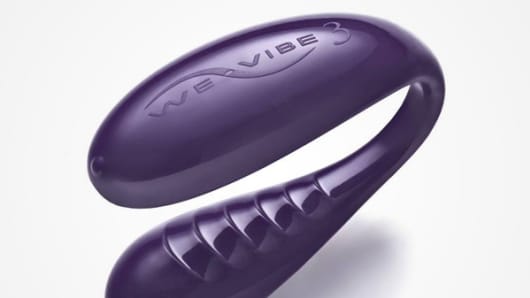Is the sex toy business all grown up?
In a highly watched case for the adult-entertainment crowd, a U.S. trade panel has ruled that several sex toy makers are violating a patent held by a Canadian company for a two-armed vibrator. The U.S. International Trade Commission ordered those competitors to stop making and selling products similar to Standard Innovation Corp.'s We-Vibe toy.
While such intellectual property battles are common in the tech industry, they've been a rarity in the adult toy sector. And some experts say the patent case is just the latest sign that sex toys have moved from niche industry to big business.
Indeed, as the traditional video side of the adult entertainment world has gone through a recession, novelties have been the growth segment. Annual sales now top $15 billion, thanks in part to the rise of high-end toys, which some couples see as an investment in their love life.
(Read More: Adult Toys are All the Buzz at Wal-Mart and CVS)
While the bullet-shaped vibrator is certainly still available, more and more manufacturers are looking to come up with unique designs and functionality to stand apart from the competition. Those differentiating factors not only allow the companies to charge a higher price, but (if patented) they give the company an exclusive market that can be quite lucrative if it catches on with consumers.
We-Vibe, which retails for $79-$170, has been one of those big hits. Over the past five years, the device has amassed cumulative sales of $100 million. And it's gaining momentum. In 2012, the company says, annual sales were 50 percent higher than the preceding year—and the company had revenues of $35 million. It expects those revenues to land between $45 million and $50 million this calendar year.
"We're clearly pleased," said Danny Osadca, CEO of Standard Innovation. "This is a substantial decision for our organization and we're very excited to get back to doing what we do best."
A primary target of Monday's federal order is Lelo, one of the industry's largest high-end sex-toy manufacturers, which has two products on the market that are similar to the We-Vibe.
Oscada says Standard Innovation next plans to continue a civil suit it had previously filed against Lelo in Texas to determine damages. (That suit was put on hold until the trade commission ruling.) The company hopes to learn how much Lelo has made off its similar products—named Tiani and Tiani 2—before it determines how much it will be seeking.
The commission has ordered Lelo to provide that information.
"We're very confident that we should be in very, very good shape in terms of the District Court," Oscada said. "The International Trade Commission, which is an expert in patents, and the judge [both] concluded that our patents were very strong."
(Read More: The Dirty Dozen 2013—Porn's Most Popular Stars)


.530x298.jpg?v=1371664033)


